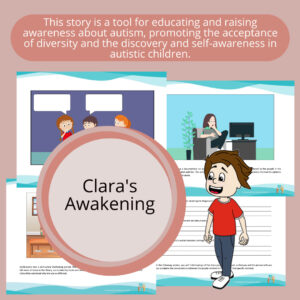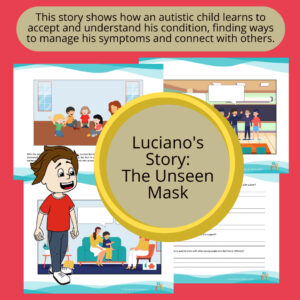Menu
Menu
The Importance of Informing Children About Their Autism
Why It Is Important
Self-Knowledge and Personal Acceptance:
Self-Understanding: When children know they are autistic, they can better understand their experiences and behaviors. This allows them to accept their differences and realize they are not alone.
Reduction of Confusion: Without this information, children may feel confused or isolated, wondering why they feel or act differently from their peers.
Promotion of Self-Esteem:
Positive Identity: Knowing they are autistic helps children form a positive identity and value themselves. They can learn to see their autism as an integral part of who they are, not something negative.
Pride and Resilience: Over time, children can feel proud of their strengths and the unique perspective they have on the world.
Promotion of Self-Advocacy:
Skill Development: By understanding their condition, children can learn to communicate their needs and seek support when necessary. This is essential for their personal development and autonomy.
Preparation for the Future: Knowing about their autism prepares them to face future challenges and seize opportunities, strengthening their coping skills.
Benefits of the Informing Process
Transparency and Trust:
Building Trust: Being open and honest with children about their autism builds a trusting relationship between parents, educators, and the child.
Clarity in Communication: Transparency avoids misunderstandings and helps children feel supported and understood.
Access to Resources and Supports:
Education and Therapy: Understanding their autism allows children to access educational and therapeutic programs designed to support their development.
Support Networks: Knowing they are autistic enables them to connect with communities and support groups that share their experiences.
Inclusive Environment:
Social Awareness: Informing children about their autism also raises awareness in their environment, promoting greater inclusion and understanding from family, friends, and educators.
Adjustments and Adaptations: With this information, adjustments can be made in educational and home environments to better support their specific needs.
Aids to Facilitate the Process
Use of Visual and Playful Resources:
Books and Videos: Using educational materials like books and videos designed to explain autism in a friendly and accessible way for children.
Games and Activities: Incorporating games and activities that facilitate the understanding and acceptance of their condition.
Emotional Support:
Open Conversations: Maintaining an open and constant dialogue, answering their questions and concerns honestly and empathetically.
Health Professionals: Having the support of psychologists or therapists who can guide and support both children and their families in this process.
Creating a Supportive Environment:
Promoting Inclusion: Involving family members, friends, and educators in creating an inclusive and understanding environment.
Community Activities: Participating in community activities and events that promote the inclusion and understanding of autism.
Conclusion
Informing children about their autism is a crucial step for their personal and social development. This knowledge provides them with a solid foundation to understand themselves, develop a positive identity, and seek the necessary support. By offering them a clear and honest explanation, along with continuous resources and support, parents and educators can empower autistic children to reach their full potential and live fulfilling and satisfying lives.
Recommended Article:
Awareness materials In this section, you will find a variety of videos and awareness materials…
Explanation for Parents and Educators on Social and Emotional Skills Worksheets The worksheets we present…
Our approach is centered on providing a comprehensive and easy-to-follow guide for teaching children effectively…
Explanation for Parents and Educators on Work Material for Teaching Conversation Skills to Autistic Children…
When to start working on the intelligence of your autistic children: It is important to…
Our material includes a detailed guide on how to teach children to improve their concentration…
Guide on Using Stories to Develop Skills and Reading Comprehension in Autistic Children and Young…
These resources have been carefully crafted with the specific needs of autistic children in mind,…
Importance of Focusing on Strengths Working on the strengths of autistic children and youth is…
This space has been created with the aim of providing parents, educators, and professionals with…
By engaging in conversation with our children, we not only boost their self-esteem but also…
The Importance of Informing Children About Their Autism Why It Is Important Self-Knowledge and Personal…
Awareness materials In this section, you will find a variety of videos and awareness materials…
Explanation for Parents and Educators on Social and Emotional Skills Worksheets The worksheets we present…
Our approach is centered on providing a comprehensive and easy-to-follow guide for teaching children effectively…
Explanation for Parents and Educators on Work Material for Teaching Conversation Skills to Autistic Children…
When to start working on the intelligence of your autistic children: It is important to…
Guide on Using Stories to Develop Skills and Reading Comprehension in Autistic Children and Young…
These resources have been carefully crafted with the specific needs of autistic children in mind,…
Importance of Focusing on Strengths Working on the strengths of autistic children and youth is…
This space has been created with the aim of providing parents, educators, and professionals with…
By engaging in conversation with our children, we not only boost their self-esteem but also…
The Importance of Informing Children About Their Autism Why It Is Important Self-Knowledge and Personal…


Quick Links

Stay Connected